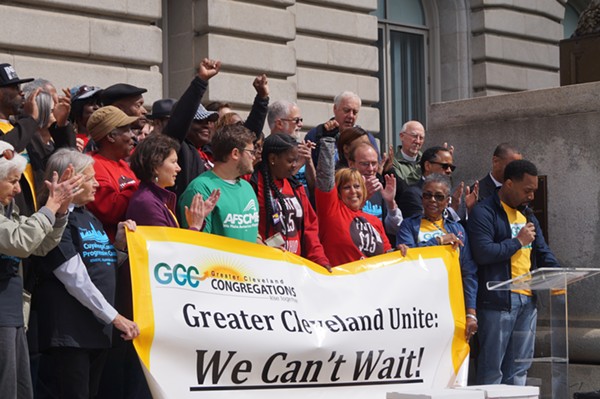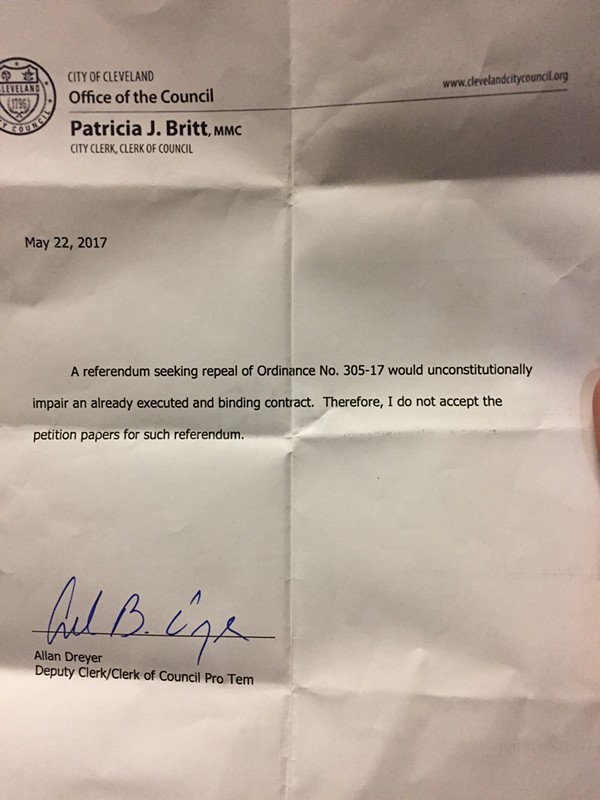
Sam Allard / Scene
Leaders of the referendum coalition speaking gathering on the steps of City Hall before their signatures were rejected.
At a noon Committee of the Whole meeting, Councilman Mike Polensek, who voted against the deal and who was one of its most vocal opponents, argued that in rejecting the signatures, council had gone beyond the issue of support of or opposition to the deal itself; they were entering territory that called into question the city charter, to say nothing of certain foundational principles of American democracy.
"Twenty-thousand signatures were submitted," Polensek said. "These are citizens. These are not illegal aliens. These are citizens of the United States and residents of the City of Cleveland. I don't know why we are denying residents their due process under the law. We've got to be real careful what we're doing here. Very careful. This is part of the basic, fundamental rights of an American citizen. We better be very careful about what decisions are being made here, and by whom."
If you ask Councilman Jeff Johnson, Council President Kevin Kelley made the decision to reject the signatures on his own, a suggestion at which Kelley balked.
Kelley repeatedly said that he'd made the decision after advice and consultation from city lawyers — both attorneys for city council (Jennifer Heinert O'Leary and Rachel Scalish) and attorneys within Barb Langhenry's office in the city's law department. Kelley would not name the names of the lawyers who'd given him advice until the end of the meeting, when he hinted that "Rick Horvath was involved." Horvath is Cleveland's Chief Corporate Counsel.
More troubling to Jeff Johnson, Zack Reed, Mike Polensek, Kevin Conwell, and even Matt Zone was the fact that this legal opinion is currently unavailable in writing.
"I don't have a written opinion," Kelley said, responding to a question from Johnson.
"So someone just told you?" Johnson replied, incredulous.
"Yeah," Kelley said.
Johnson, who doubted Kelley's explanation, wanted a written opinion by Monday's 7 p.m. council meeting, but Kelley said that that couldn't happen on such short notice. Johnson took exception to that as well. "I'd like to remind everyone that it's 1:24 p.m.," he said, at 1:24. "I've seen these opinions produced in an hour. It could be the two sentences you just said."
The two sentences in question were loosely paraphrased from the two sentences that were handed to representatives of the referendum coalition when they tried to officially submit their signatures earlier in the day. The petition required 6,000 valid signatures. The coalition had collected more than 20,000 in less than 30 days.
"A referendum seeking repeal of Ordinance 305-17 [the Q Deal] would unconstitutionally impair an already executed and binding contract. Therefore, I do not accept the petition papers for such referendum," read the message signed by Deputy Clerk Allan Dreyer.
Members of the Greater Cleveland Congregations, Service Employees International Union Local 1199, the Cuyahoga County Progressive Caucus, AFSCME Ohio Council 8, and Amalgamated Transit Union Local 268 had given a brief press conference at 10:30 a.m. outlining their position once again. Pastors Richard Gibson and Jawanza Colvin spoke about GCC's idea for a Community Equity Fund, with money that would go toward a job pipeline, mental health access and neighborhood investment. Colvin said that the city was in a "state of emergency," and railed against the idea of committing millions of public dollars without input from the public itself.
"We want a better deal or no deal at all," Colvin said.
And yet, Kelley, via counsel, personally decided the City Council position: that the signatures would not even be accepted because of an existing contract. (Council did agree to receive the four boxes of signatures for safekeeping, but in another memo to the coalition signed by Dreyer, said that they did not consider the petition to have been filed with the Clerk.)
Polensek wondered to which contract Dreyer's first message referred. It was his understanding that the County hadn't yet sold the renovation bonds, as the county was waiting for a resolution on the referendum issue, per the advice of financial adviser Timothy Offtermatt. Kelley said that there were other contracts that had been signed, city contracts.
Johnson and Reed, reeling, asked what contracts Kelley was talking about. (This remained unclear.) "Can I get a copy of those?" Reed asked. "Because I haven't seen a single one."
During one heated exchange, Johnson demanded that Kelley let the public know how he'd arrived at the decision he did. Johnson would not, he said, allow himself be embarrassed by "the circus" over which Kelley was presiding.
"I need to know who gave you that opinion," Johnson said. "Was it our folk? Was it Barb Langhenry's people?"
"It was both," Kelley said. "While we live in a public realm where almost everything is public record, there's still attorney-client privilege on certain matters."
"Who's the client here?" Johnson asked.
"Council," said Kelley.
"That's right," said Johnson. "Am I a member of council?"
"As far as I know," Kelley said.


